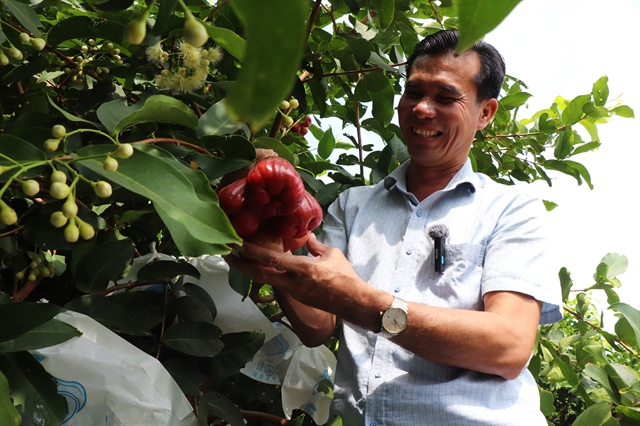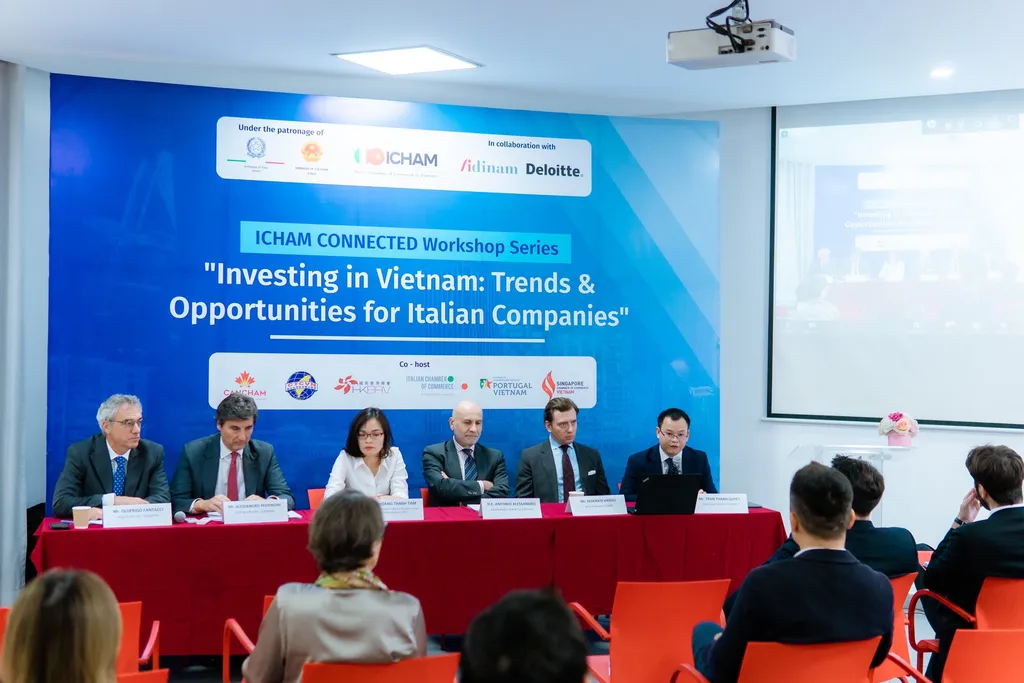 Economy
Economy

{ "id": "PDLee8kUSV", "type": "myToolImages", "data": { "data": "" } }
 |
| Distinguished guests at the workshop discuss business opportunities for Italian companies. — VNA/VNS Photo Lê Việt Dũng |
{ "id": "rJNkzJQzJl", "type": "myToolImages", "data": { "data": "" } }
HÀ NỘI — More than 6,000 Italian enterprises are doing business in Việt Nam and the Italian government has put Việt Nam on the list of 20 countries prioritised for trade and investment promotion until 2030, according to Dương Hải Hưng, ambassador of Việt Nam to Italy.
Hưng made the remarks at a workshop "Investing in Việt Nam: Trend and Opportunities for Italian companies" held by the Italian Chamber of Commerce on Thursday.
The Ambassador underlined Italian advantages in both traditional and novel industries, including automation and renewable energy, which are essential to Việt Nam's industrialisation and modernisation.
However, he believed that the potential of bilateral economic relations has yet to be fully unlocked, given that Italy is the 8th-largest economy in the world and a member of the G7 and G20.
As such, he called for the Italian Parliament's ratification of the EU-Việt Nam Investment Protection Agreement to ensure better protection of enterprises from both countries.
He also urged Italian enterprises to rely on the Việt Nam-Italy Joint Committee on Economic Cooperation for advice and support, which would help them gain entry into the Vietnamese market more easily.
"I believe that Italian investment in Việt Nam would rise steadily in the near future," said Hưng.
Antonio Alessandro, ambassador of Italy to Việt Nam, remarked that Việt Nam now is more of a destination for value-added investment than for cheap labour manufacturing. The country has become more selective in choosing its foreign investors.
"Skilled labour, good human resources, sound business environment, and political and social stability are the factors encouraging foreign enterprises to come to Việt Nam," said the ambassador.
He also said bilateral trade is rising year by year, reaching US$6.2 billion in 2022. However, on the Italian side, the gap between imports and exports is widening, exposing the need for measures to boost Italian exports to Việt Nam.
Lastly, the ambassador mentioned several sectors well-suited to Italian companies aiming to establish their presence in the country, including green energy, agriculture, and music.
Olderigo Fantacci, director of the Foreign Direct Investment Desk, Italian Trade Commission, highlighted three main factors that have brought Việt Nam into the spotlight: its high economic growth, integration into the global economy, and strategic position.
He said Việt Nam is growing not only in terms of GDP but also of GDP per capita. This rise in average income has turned Việt Nam into a lucrative consumer market for Italian manufacturers.
More importantly, the free trade agreement signed between Việt Nam and the European Union (EU) has made the country more open to Italian trade as the treaty has fully eliminated the customs duties applied to machinery and textile, and will phase out some others in the next few years.
The director also revealed that the main goal of Italian companies going abroad is not to reduce costs but to create integrated value chains, especially those involving Japanese and Korean partners.
Because of that, Việt Nam would likely become a destination of interest for Italian companies as the country has a strong cooperation with Japanese and Korean investors.
"Việt Nam could be, potentially, a destination where Italian companies can deal with Japanese and Korean companies," said Fantacci.
Bùi Phương Thảo, managing director of the Fidinam Company Ltd., highlighted three types of commercial presence in Việt Nam, namely company, representative office, and branch.
Legally, representative offices are not allowed to engage in profit-generating activities. Rather, they are limited to only market research and promotion activities. Branches, on the other hand, have the leeway to perform certain services, including construction and technical related services.
Most of the foreign-invested companies in Việt Nam are established as a limited liability company or joint stock company. These two types of companies are popular with foreign investors because stakeholders are responsible for debts and other liabilities of the company only to the extent of the capital contributed.
It is also worth noting that foreign investors will follow two steps to set up a foreign-owned company in the country. The first step requires the application for an Investment Registration Certificate (IRC) and the second involves an Enterprise Registration Certificate.
However, in some special cases, the legal procedures might be different. For example, foreign investors who establish medium- and small-size innovative start-ups are not required to obtain IRC.
Alexandro Pedrironi, CEO of the Fidinam Asia Pacific, told Việt Nam News that the investment climate in Việt Nam has become more favourable in recent years. As such, the country is well-positioned to allow foreign companies to set up manufacturing sites and expand their presence in Southeast Asia.
"In terms of logistics, Việt Nam is well-located in the region, being the natural bridge between mainland China and Southeast Asia," said Pedrironi.
He said the trade agreement signed between Việt Nam and the EU has facilitated the commercial flows between the two countries. However, some efforts still need to be made to explain its benefits to more Italian companies.
He called for the simplification of regulations to make it easier for Italian companies to get entry into the country. He also highlighted the importance of facilities and infrastructure, which need to keep pace with their logistical needs. — VNS




